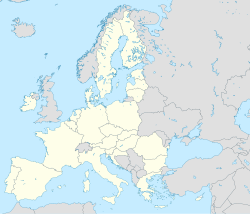|
Elusa (ancient capital)
Elusa is the Aquitani-Roman city of the Elusates in Caesar's southwestern Gaul, the present-day town of Eauze in the Gers département. The city's name comes from the name of the Aquitanian (proto-Basque) Elusates people.[1] It evolved into Elsa in the 10th century, then Euso in Gascon and, finally, Éauze in French. History The Elusates are mentioned by Julius Caesar in his Commentaries on the Gallic War, as one of the Aquitanian peoples defeated by his lieutenant Publius Crassus in 56 BC. Their territory, augmented by that of the Sotiates, was chosen for the establishment of a city endowed with colonial-style Roman urban planning. Elusa was founded at the beginning of the 1st century AD, 3 km south of the Elusates oppidum, on the first terrace overlooking the Gelise river. The streets, cardo and decumanus, forming an orthogonal urban grid, were laid out at this foundation. The city was integrated into the network of major Roman roads. It became a civitas and a colonia under Latin law. As early as the 1st century AD, Elusa was administered by a college of notables, the Ordo elusatium, and led by two Duumviri. There is also evidence of a Flamen, who worshipped Rome and Augustus. Benefiting from the Pax Romana during the High Empire, the city prospered and reached a surface area of some 50 hectares. Lapidary inscriptions show that the city particularly honored the Severan dynasty (193-235). Towards the end of the 2nd century, the city was elevated to the rank of metropolis, administrative capital of the Roman province of Novempopulania. It appears that the city was still flourishing in the 4th century. Its decline was marked from the 5th century onwards. As the seat of a metropolitan bishopric, Elusa's list of prelates can be traced back to the end of the 6th century. As a sign of its decline, from the ninth century onwards, the title of metropolitan was given to the bishops of Auch, as the two bishoprics were merged. Some of the people born in Elusa
Ancient ruins
See alsoReferences
Bibliography
|
||||||||||||||||


